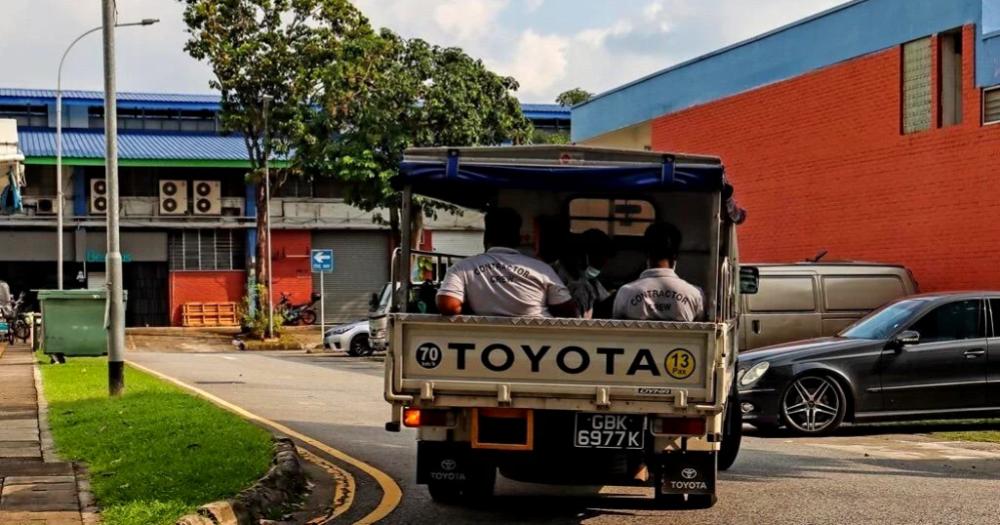The government should work closely with relevant stakeholders and non-governmental organisations (NGOs) to look at practical, workable solutions to safeguard the safety and livelihoods of workers, said Amy Khor, Senior Minister of State for the Ministry of Transport (MOT) said.
She was addressing questions that Member of Parliament (MP) Louis Ng posed, addressing the mode of transportation for workers.
Specifically, he asked whether companies are open to transporting their workers by buses or other modes of transport.
What the government has done
Khor said that the government has introduced additional safety measures to safeguard workers' well-being.
This includes a government mandate which requires the front passenger cabin to be fully occupied before the rear deck of the lorry can be used to carry workers.
Lorries used to transport workers also have to be fitted with canopies and higher side railings.
The government has also raised requirements for S Pass and Work Permit Holders to obtain a class three license that will allow them to drive light goods vehicles.
Higher penalties are also imposed for non-compliance.
According to Khor, these measures have enhanced safety and reduced risks for workers, reducing the number of fatalities from road traffic accidents involving persons onboard lorries from six per year from 2013 to 2017 to around three per year from 2018 to 2022.
"The government recognises that it is not ideal for workers to be transported on lorries," Khor said. "But we also understand the genuine concerns from employers."
Business statement
Khor brought up a joint statement which was issued yesterday (Aug. 1) by more than 20 industry associations.
It claimed that if the government imposes a ban on transporting workers on lorries, then companies, especially small and medium enterprises, will not be able to continue operating their businesses and risk closing down, and therefore risk ongoing construction projects.
Working closely with relevant government agencies
Khor said that the Ministry of Transport has been working closely with other relevant government agencies to develop practical solutions and implement additional measures to improve the safety of workers.
This includes minimum rest time requirements for dual role drivers. All lorries are also required to be fitted with speed management devices, which will be announced by MHA later this year.
Traffic police will also continue enforcement to ensure compliance with existing traffic regulations.
Khor said the way forward is to work with stakeholders, including NGOs, to develop practical solutions in the best interest of workers to protect their safety and livelihoods.
Legacy provision
Khor then offered the rationale for the ban under section 126 of the Road Traffic Act 1961 on carrying any person in or allowing any person to ride in goods vehicles.
The act is a legacy provision which has been in the act since it was first passed in 1961.
While the ministry does not have records that can definitively confirm the rationale for this ban, they surmised that the likely intent was to prevent lorries from being used to provide commercial taxi-like services.
Issue has been in discussion for 14 years: Louis Ng
"I understand the reply (to my question) is no," Ng commented as he followed up on Khor's statement in a supplementary question.
Ng asked whether the MOT is open to setting up a new workgroup comprising companies including SMEs and NGOs with the purpose of discussing whether there should be a timeline towards a ban on the transportation of workers.
"Just a week after my motion, there [were] another two accidents carrying these workers and another 37 workers were injured".
Ng stressed that the issue of transporting workers has been in discussion for 14 years, to no avail.
"I really hope that we can have a greater sense of urgency, not an immediate ban, but bearing in mind that we have talked about this for 14 years now," he said.
Ng also asked whether MOT will consider providing funding or subsidies towards the transition towards safer mode of transport for workers.
"We are all on the same page": Khor
Khor reiterated that while the ministry understands it is not ideal to transport workers on lorries, there are also "real physical and operational constraints" from the industry.
"We are all on the same page," Khor said, adding that the priority is to ensure safety for road users, including workers.
She stressed that the way forward is to continue working closely together to look at practical, workable solutions with stakeholders, including NGOs, which are in the best interest of workers instead of talking about timelines.
Related stories:
Top image via.
If you like what you read, follow us on Facebook, Instagram, Twitter and Telegram to get the latest updates.



